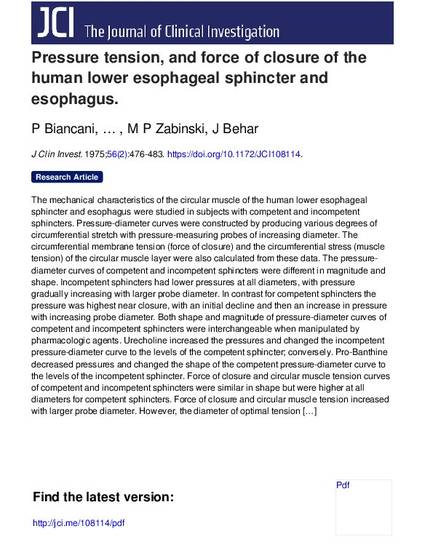
The mechanical characteristics of the circular muscle of the human lower esophageal sphincter and esophagus were studied in subjects with competent and incompetent sphincters. Pressure-diameter curves were constructed by producing various degrees of circumferential stretch with pressure-measuring probes of increasing diameter. The circumferential membrane tension (force of closure) and the circumferential stress (muscle tension) of the circular muscle layer were also calculated from these data. The pressure-diameter curves of competent and incompetent sphincters were different in magnitude and shape. Incompetent sphincters had lower pressures at all diameters, with pressure gradually increasing with larger probe diameter. In contrast for competent sphincters the pressure was highest near closure, with an initial decline and then an increase in pressure with increasing probe diameter. Both shape and magnitude of pressure-diameter curves of competent and incompetent sphincters were interchangeable when manipulated by pharmacologic agents. Urecholine increased the pressures and changed the incompetent pressure-diameter curve to the levels of the competent sphincter; conversely. Pro-Banthine decreased pressures and changed the shape of the competent pressure-diameter curve to the levels of the incompetent sphincter. Force of closure and circular muscle tension curves of competent and incompetent sphincters were similar in shape but were higher at all diameters for competent sphincters. Force of closure and circular muscle tension increased with larger probe diameter. However, the diameter of optimal tension development was larger than the largest probe used and certainly far from closure. Fundoplication increased the magnitude and changed the shape of the incompetent pressure-diameter curve to one similar to a competent curve. This pressure change was associated with an increase in the force of closure, suggesting that fundopliation modified the length-force of closure characteristics of the incompetent spincter.
Available at: http://works.bepress.com/michael-zabinski/3/

Copyright 1975 American Society for Clinical Investigation
The final publisher PDF has been archived here with permission from the copyright holder.